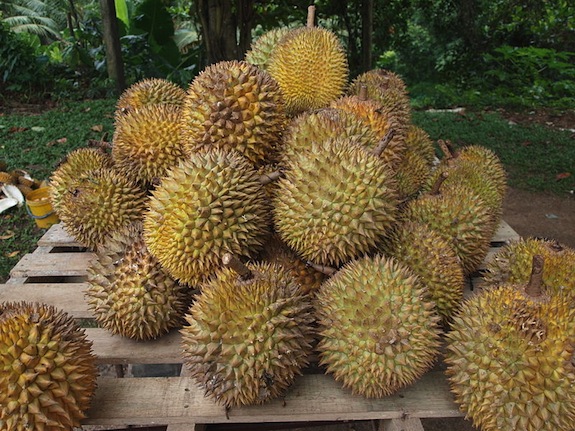Why Does the Durian Fruit Smell So Terrible?
Scientists examine what chemicals make the Asian fruit smell like “turpentine and onions, garnished with a gym sock”
![]()

Durians have a notorious aroma likened to rotting meat, turpentine and gym socks. Image via Wikimedia Commons/Kalai
If you’ve smelled a durian even once, you probably remember it. Even with the husk intact, the notorious Asian fruit has such a potent stench that it’s banned on the Singapore Rapid Mass Transit. Food writer Richard Sterling has written “its odor is best described as…turpentine and onions, garnished with a gym sock. It can be smelled from yards away.”
A small minority, though, love the smell and taste of the fruit. Anthony Bourdain calls it “indescribable, something you will either love or despise…Your breath will smell as if you’d been French-kissing your dead grandmother.” The fruit’s flesh is sometimes eaten raw, or is cooked and used to flavor a number of traditional Southeast Asian dishes and candies. It’s also used in traditional Asian medicine, as both an anti-fever treatment and a aphrodisiac. Our “Off the Road” blog profiled a pair of intrepid travelers on a year-long journey planned around tasting different varieties of durian.

Durians are banned on Signapore’s mass transit, among other public places, because of their potent scent. Image via Wikimedia Commons/Steve Bennett
What everyone can agree on is that the fruit’s odor, whether pleasant or dreadful, is uncommonly potent. Now, in a new study in the Journal of Agriculture and Food Chemistry, a group of scientists from the German Research Center for Food Chemistry has attempted to figure out how exactly the fruit produces such a powerful stench.
In breaking down aroma extract, taken from Thai durians, with a mass spectrometer and gas chromatograph, the team, led by Jia-Ziao Li, pinpointed 50 discrete compounds in the fruit responsible for its uncommon aroma. Those compounds included eight that hadn’t been detected in durians before—and four compounds that had been completely unknown to science.
Their analysis suggests that it is not any single compound but instead the mixture of different chemicals that produces the fruit’s powerful stench. The compounds are identified by their chemical formulas, which are likely cryptic to anyone without a degree in organic chemistry (1-{sulfanyl}ethanethiol, for example), but the research team associated each one with a particular odor.
What’s interesting is that none of the compounds individually seem to match with the characteristic durian smell—they range widely, and include labels like fruity, skunky, metallic, rubbery, burnt, roasted onion, garlic, cheese, onion and honey. A number of them have been detected in just a few other substances, such as cooked beef, yeast extract, dried squid and leeks. Somehow, the combination of these 50 chemicals produces the powerful scent that has entranced and repulsed people the world over.
Even apart from the smell, durians are a scientific marvel. According to a 2009 Japanese study, durian extract strongly inhibits the enzyme aldehyde dehydrogenase (ALDH), used by the liver to break down alcohol. This might account for a piece of traditional Asian folklore: that getting intoxicated while eating durians can lead to death.
/https://tf-cmsv2-smithsonianmag-media.s3.amazonaws.com/accounts/headshot/joseph-stromberg-240.jpg)
/https://tf-cmsv2-smithsonianmag-media.s3.amazonaws.com/accounts/headshot/joseph-stromberg-240.jpg)